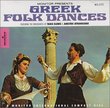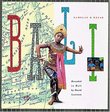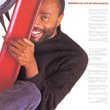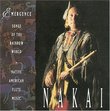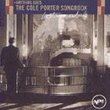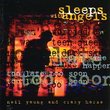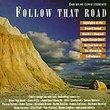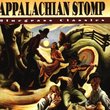| All Artists: Franz Schubert, Ian Bostridge, Julius Drake Title: Ian Bostridge - Schubert Lieder, Volume I Members Wishing: 0 Total Copies: 0 Label: EMI Classics Release Date: 7/14/1998 Genres: Pop, Classical Styles: Vocal Pop, Opera & Classical Vocal Number of Discs: 1 SwapaCD Credits: 1 UPCs: 724355634726, 724355634757 |
Search - Franz Schubert, Ian Bostridge, Julius Drake :: Ian Bostridge - Schubert Lieder, Volume I
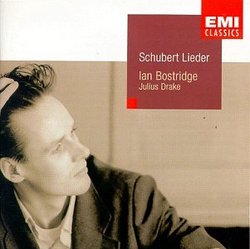 | Franz Schubert, Ian Bostridge, Julius Drake Ian Bostridge - Schubert Lieder, Volume I Genres: Pop, Classical
Ian Bostridge has chosen a kaleidoscopic variety of songs by the greatest of all songwriters. The attractions and challenges of these songs are poetic and dramatic as well as musical, and Bostridge and Drake mobilize a wid... more » |
Larger Image |
CD DetailsSynopsis
Amazon.com Ian Bostridge has chosen a kaleidoscopic variety of songs by the greatest of all songwriters. The attractions and challenges of these songs are poetic and dramatic as well as musical, and Bostridge and Drake mobilize a wide range of expressive skills to reinforce their pure musicianship. They are intensely involved in storytelling in the playfully serious "Die Forelle" (The Trout) and "Heidenroeslein" (Wild Rose), in the grotesque "Der Zwerg" (The Dwarf) and the spooky "Erlkonig," which gallops through a story of a fruitless race against death. Tranquility reigns in the "Wandrers Nachtlied" (Wanderer's Night Song) I and II; hushed awe in "An die Musik" (To Music--a performance that brings tears to my eyes) and "Du bist die Ruh" (You are Peace); and idealistic love in the Shakespearean "An Sylvia" ("To Sylvia"). Each song creates a world of its own, superbly embodied in these performances. --Joe McLellan Similar CDs
Similarly Requested CDs
|
CD ReviewsALMOST TOO BEAUTIFUL J. C. Bailey | East Sussex United Kingdom | 10/10/2002 (5 out of 5 stars) "These are some of the best known songs by the greatest songwriter of all time, and Bostridge brings his usual beautiful tone and phrasing to each one of them. For a new listener to classical songs wanting an overview of Schubert's 500 or more "lieder" (famous romantic poems set to original music), Bostridge's warm phrasing, his soft but accurate German, and the fine playing of accompanist Julius Drake, will make this recital perfect. At this level of artistry, it is almost silly to indulge in any nitpicking, but listeners who are already familiar with recitals by the German masters may find some of these tenor interpretations just too lyrical. Take the two grim Gothic fantasies as the clearest example: "Der Zwerg" depicts a beautiful young queen being slowly strangled and dumped into the sea by a twisted and deformed court jester who has been driven mad by jealousy for her affections. "Erlkonig" tells of a man racing through the forest on horseback unaware that the soul of the young son in his arms is being stolen away by the phantom Forest King. These are hideous images, and I am not completely convinced that Bostridge (for all his staggering talent and discipline) has yet developed the subtle dramatic judgement that they demand - the great Fischer-Dieskau has confirmed that in this regard the lied is infinitely more demanding than opera. Thus in Der Zwerg, the sustained beauty of Bostridge's singing gives us few cues that we are listening to anything radically different from the ruminations on love, art nature and loss that make up the bulk of the album. And yet in Erlkonig (a specially demanding piece that requires the singer to represent a narrator and three different characters), he overshoots in the opposite direction - he gives a performance of chilling power and dramatic range, but only at the expense of the subtlety and the overarching unity of style and voice that should set even the most dramatic art-song apart from opera. (The singer of a narrative song is required to be a story-teller, not an actor). These quibbles needed explaining, but they will be of minor importance to anyone but a Teutonic purist. Bostridge's glorious bel canto voice, already one of the brightest lights in Britain's music industry, may at present be less than perfectly matched to the classical German art-song. However, few exponents of the lied have reached musical maturity before middle age, and Bostridge (whose cover photo incidentally bears a striking resemblance to the great French baritone, Gerard Souzay) has many years in which to develop this highly specialised art. More to the point, this is a fine album in its own right, and one that will sound better to most British and American ears than the gruffer and more clipped renditions of the great German baritones." A promise of things to come Clark | 08/30/2005 (3 out of 5 stars) "I must be entirely honest and say that this was a disappointment to me. That comes, I promise, from probably the one person in the world most obsessed with Ian Bostridge's voice. The reason is that I had heard so much of his subsequent work. The depth, color, agility, and timbre of his voice is simply spell-binding, but all of it is acquired, added to his natural melodic talent. So this, an earlier recording, holds less of that acquired beauty than later albums, particularly the Debussy, Faure, & Poulenc and Schubert Lieder, Vol II. If you're looking for Schubert sung in a subtly emotional and petulent way, this is for you. I cannot say that his execution is particularly fulfilling, nor his German as good as it is now, nor his voice as rich -- he almost sounds tired in much of it -- but what you will hear is a promise of better things to come as he grows musically. Personally, I think we should form a petition to get him to record another Lieder disc including a better version of Du Bist Die Ruh." Warm Honey Gold Gloria | San Francisco Bay Area, CA | 10/14/2001 (5 out of 5 stars) "I love the thought of Ian singing lullabies to his little baby son. If Ian's voice were a color it would be a warm, mellow shade of honeyed gold. I was playing this CD in my car, track 14, when my friend said, "WHO is THAT?" I told him and he said, "His voice is so incredibly warm! I've never heard a voice like that before; the voice is so strange!" As if anyone could, or should, Julius just knows how to play how water sounds. Auf dem wasser zu singen could easily have been included without the vocals, *although I am by no means complaining*. Julius and Ian read each other musically as if God made them from the same lot and stock.Du Bist die Ruh makes me cry, I sing along with Heidenroslein, and the Litanei auf das Fest Allerseelen is as prayerful as is Dinu Lipatti's last concert at Besancon (hi Jim!). I think my favorite song is the last. The Erlkonig is incredibly sinister, evil to the core! And the boy, I just want to help him somehow. Ian is a master storyteller with a fine voice and great German. We are completely satisfied!"
|

 Track Listings (22) - Disc #1
Track Listings (22) - Disc #1
